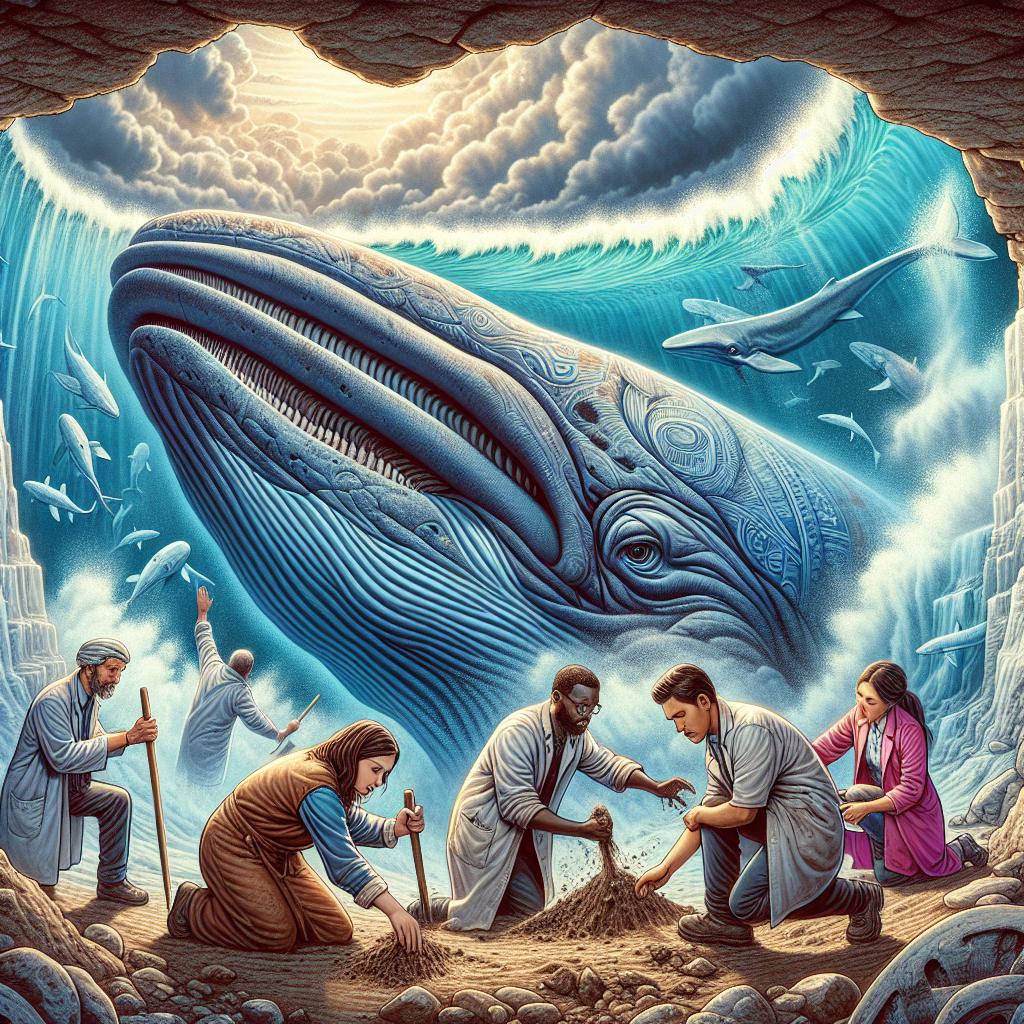
Whale of Faith: Unveiling the Divine Truths
Published: 01 September 2024
A Whale of a Tale: Unraveling the Fossil Evidence
The discovery of fossilized bones in Pakistan has led to claims that a creature called Ambulocetus was a "walking whale," potentially serving as an ancestor to today's whales. However, a closer examination of the evidence reveals that there are several missing and fragmented parts of the skeleton, making it difficult to draw definitive conclusions. In this article, we will delve into the topic of Ambulocetus and its alleged connection to whale evolution. We will explore key questions about this fossil find and provide biblically grounded answers from a conservative Christian perspective.
1. What is Ambulocetus, and what does the fossil evidence suggest?
Ambulocetus is a creature whose fossilized bones were discovered in Pakistan. The main claim made by some researchers is that Ambulocetus was a "walking whale" with hind limbs that functioned as legs on land and paddles/flippers in water. However, the fossil evidence is incomplete and highly fragmented. Critical parts of the skeleton, such as the pelvic girdle, humerus, and scapula, are missing. Without these crucial elements, it is challenging to determine the function of the hind limbs or interpret the creature's movement.
2. How do paleontologists establish evolutionary relationships based on fossil evidence?
Paleontologists use various criteria to establish evolutionary relationships based on fossil evidence. One approach is to identify shared characteristics, or homologies, between different species. These shared features can indicate common ancestry. However, it is essential to exercise caution when interpreting these characteristics. Some features may have a broader distribution than originally thought and may not be exclusive to a specific lineage.
3. What are the challenges in classifying Ambulocetus as a whale?
Classifying Ambulocetus as a whale based on its characteristics presents several challenges. Researchers have proposed a list of features that unite whales, such as the alignment of incisors parallel to the tooth row and specific characteristics of teeth. However, Ambulocetus does not possess all these defining features. Additionally, there are significant differences between Ambulocetus and other known archeocetes (ancient whales), including variations in vertebrae specialization.
4. What evidence supports the claim that Ambulocetus was a land-dwelling creature?
Several lines of evidence suggest that Ambulocetus was a land-dwelling creature rather than a transitional form leading to whales. The robust femur and the presence of a hoof indicate adaptations for terrestrial locomotion. Moreover, the absence of caudal vertebrae with large processes for muscle attachment contradicts the requirements for tail involvement in swimming, a characteristic of whales.
5. How reliable is the scientific process when it comes to paleontology?
The acceptance and publication of scientific papers are subject to peer review, which aims to ensure rigorous evaluation of research methodology and conclusions. In the case of paleontology, some critics argue that the peer review process may not always be as robust as in other empirical fields of science. This discrepancy may be due to the nature of paleontological research, where interpretations often rely on incomplete fossil evidence and require substantial reconstruction based on limited findings.
6. What does the age of Ambulocetus fossils tell us about its relationship to modern whales?
Ambulocetus fossils were found in "lower to middle Eocene" beds. Fossils of whales from the suborder Archeoceti have also been discovered in lower Eocene strata. The existence of these older whale fossils suggests that Ambulocetus is unlikely to be a direct ancestor of modern whales, as claimed by some researchers.
7. Have there been any updates on Ambulocetus since the initial research?
Since the initial research on Ambulocetus, additional fossil remains have been discovered and published. However, these new findings do not provide compelling evidence to support Ambulocetus as a transitional form between whales and land animals. The new material does not reveal the development of crucial whale characteristics, such as horizontal tail flukes or unique hearing systems.
8. What are the implications for the theory of whale evolution?
The theory of whale evolution faces significant challenges when considering the complex changes required to transform a land creature into a whale. The extensive list of modifications necessary for such a transition includes adaptations like counter-current heat exchangers, ball vertebrae, tail flukes, blubber insulation, specialized breathing mechanisms, and many others. Population genetic calculations demonstrate that even with millions of years, the required mutations would be highly unlikely to occur and become fixed in a population. The fossil evidence surrounding Ambulocetus does not provide conclusive support for its classification as a "walking whale" or a transitional form leading to modern whales. The incomplete and fragmented nature of the skeleton, along with missing critical elements, makes it challenging to draw definitive conclusions. Additionally, the lack of crucial whale characteristics in the discovered fossils further weakens the case for Ambulocetus as an ancestor to whales. As Christians, we can approach scientific theories with discernment and critically evaluate the evidence while remaining grounded in our biblical worldview.
